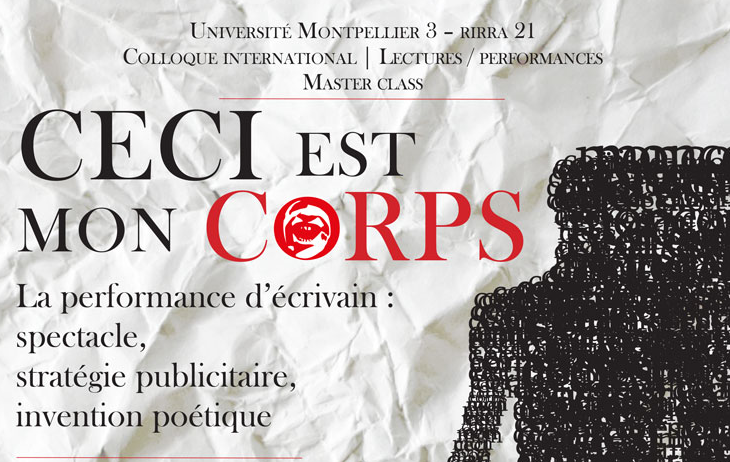Literature outside the book and transmediality

Ceci est mon corps (“This Is My Body”), an expression with strong biblical connotations, was the title of a three days gathering at the University of Montpellier 3 on the theme of the literary performance, more specifically on the performance of writers on stage (1). Mixing traditional communications, various forms of interactions between academics and authors, and a very rich program of actual performances (all one man or one woman performances, with relatively little technology involved), the conference had a twofold ambition, historical as well as theoretical. On the one hand, it aimed at challenging the idea that authors on stage are just a recent phenomenon. On the other hand, it tried to offer a new mapping of the field and to establish a workable taxonomy of the myriad of practices that characterize the general topic of literary performance.
The general context of the conference was the growing awareness of the fact that even traditional literature, that is literature made to be read in books by silent readers, is questioned nowadays by what is called in France literature outside the book (“la littérature hors du livre”) (2), a rather general label that refers to both intermedial and transmedial expansions of the text. The literary performance, which goes beyond the well-known public reading of a text in order to produce on stage a unique event that is not supposed to exist the hic et nunc of the actual performance, is one of the most striking examples of this move from literature in print to literature outside the book. It is the symptom of a dramatic change, which demonstrates the exhaustion –yet not the death or the disappearance– of print culture, which is already adapting to the new situation. At the same time, the literary performance is also of interest for transmedia theory, since it discloses a certain number of tendencies that are not always closely examined by the emerging theoretical mainstream in the field.
Two elements come here to the fore. First of all, it seems that the literary performance, which at first sight can be read as a new aspect of the increasing transmedialization of literature in print, is somewhat at odds with the general idea of transmediality itself. Stressing the unique and specific features of the performative event, most lecturers and practitioners of the conference defended the idea that the literary performance, even when it is part of a larger set of media forms a work can take, is itself so unique and so specific that it cannot be considered part of a larger whole (that is: the transmedia network produced by an original idea or project). In that sense, one might even have the impression that the literary performance is less an example of modern transmedialization than a new attempt to reinvent the absolute uniqueness and distinctiveness, not only of each work, but of each actual realization of this work. In that sense, it should not come as a surprise that certain performances do no longer emphasize the “work” that is being read, shown or produced on stage, but the very “process” of doing something on stage. At the center of the performance one does no longer find the work, but the body of the author and its interaction with the living audience.
The second observation has to do with the relationship between the various media forms a transmedial work can take. Even if one accepts (for not everybody will follow the radical stance of absolute uniqueness explained above) that the literary performance remains part of a work that now exists as a transmedial network, the various forms such a work can take should not be seen as equal. It may be true that the spirit of transmedia writing (it would be too narrow to focus on storytelling alone) is to explore and use as many media as possible. In practice however, not all of these media are equal. According to the specific project one tries to elaborate, certain forms of transmedialization simply do not work and are therefore either progressively abandoned or excluded from the beginning. The examples of literary performances that were discussed or shown during the conference were often very clear in this regard. Transmediality is not only a success story (always more, always better, always better, etc.), it is also the story of many failures and dead ends, often more interesting to study than the actual successes –and absolutely necessary for the more nuanced theory of transmedia we try to build.
(1) The detailed program can be found here.
(2) For a recent and already very strongly institutionalized example, see the “ festival EXTRA!” at Centre Pompidou-Beaubourg in Paris (6-10 September 2017).

